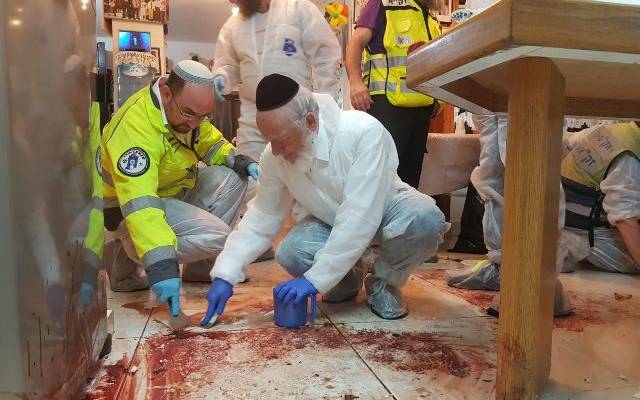“We must strengthen ourselves, we must pray that there will be an end to these horrific terror attacks,” says Moti Bukchin, who was alerted to the scene of Friday’s terror attack.
Moti Bukchin, a community emergency-response volunteer with ZAKA, was alerted to the grisly scene where a 19-year-old Palestinian terrorist stabbed three family members to death Friday evening in the Jewish community of Neve Tsuf, also known as Halamish.
The brutal murder occurred as the family was enjoying their Shabbat meal and gathering to celebrate the birth of a new grandson.
An off-duty IDF soldier who heard the commotion rushed to the scene and neutralized the terrorist, Omar al-Abed, from the village of Kobar near Ramallah. He was treated for an abdominal wound and then turned over to Israeli security forces.
The victims are Yosef Salomon, 70, and his children Chaya Salomon, 46, and Elad Salomon, 36. Yosef’s wife Tova, 68, was seriously wounded and underwent surgery at Jerusalem’s Shaare Zedek Medical Center.
So Much Blood in the Home
Emergency services encountered the most shocking of scenes: a house ready for Shabbat, with the table prepared and food and drink on the table in honor of the new grandchild, a celebration traditionally called a Shalom Zachar. But everywhere in the home, there was so much blood from the victims.
Moti, who specializes in recovering the remains of victims of terrorism and treating them in accordance with Jewish law, arrived at the house on Saturday night, after Shabbat had ended.
“It was a perfect Shabbat, with many guests, delicious food,” he recounted. “The end of Shabbat was approaching and, together with my son and our guests, we made our way to the house of my friend Gadi Whitman for evening prayers. In my heart, I wished that Shabbat would not end.”
“Only when we had finished, did Gadi’s son tell us the painful news: “There was a horrific terror attack last night in Halamish and there are several fatalities.”
“As a veteran ZAKA volunteer, I fully understand the significance of the news and hurried home.”
“The fragrance of Shabbat still lingers in my home, my children are playing happily. But I ask that we make Havdalah [end-of-Sabbath ceremony], quickly, update my wife with the terrible news and tell her that I must leave immediately for the terror scene.”
“In the meantime, I turn on my cellphone and I see many missed calls. The first person I call back is Berele Ya’acobovitz, one of ZAKA’s most respected volunteers. “We are on our way to give assistance to volunteers from the ZAKA Shai [Judea and Samaria] region, who are already at the scene,” he explains to me.
“Of course,” I reply. “I will leave home as soon as I finish making Havdalah”
Significant Words of Prayer
“I go back to the kitchen, where everything is ready for Havdalah. The candle is burning, my family and Shabbat guests are waiting for me to begin. As I begin to recite the Havdalah prayers, the words take on even more significance and meaning: Behold, God is my savior, I will trust God and not be afraid.”
“My thoughts are already drifting to the terror scene and the victims’ families. I complete the Havdalah ceremony with the words “who separates between the holy and the profane; between the light and dark; between Israel and the other nations.”
“How quickly does the life of a ZAKA volunteer shift from the joy of Shabbat to the terrible sadness of bereavement, a thought that follows me all the way to the terror scene. We were so joyous, spending such a pleasant Shabbat with family and friends and only a few kilometers away this terrible terror attack took place… A Jewish family struck down in the midst of a Shabbat meal, celebrating the birth of a new grandchild. What can be more shocking and horrific than that?”
“We must strengthen ourselves, we must pray that there will be an end to these horrific terror attacks and may we speedily merit Redemption in our days. Amen and may we share only happy times.”
ZAKA (the Hebrew acronym for Disaster Victim Identification), established in 1995, is an Israeli non-governmental lifesaving, rescue and recovery unit, a volunteer-based organization with about 1,500 members.
It specializes in recovering the remains of victims of terrorism and disasters and treating them in accordance with the Jewish law.
By: United with Israel Staff
